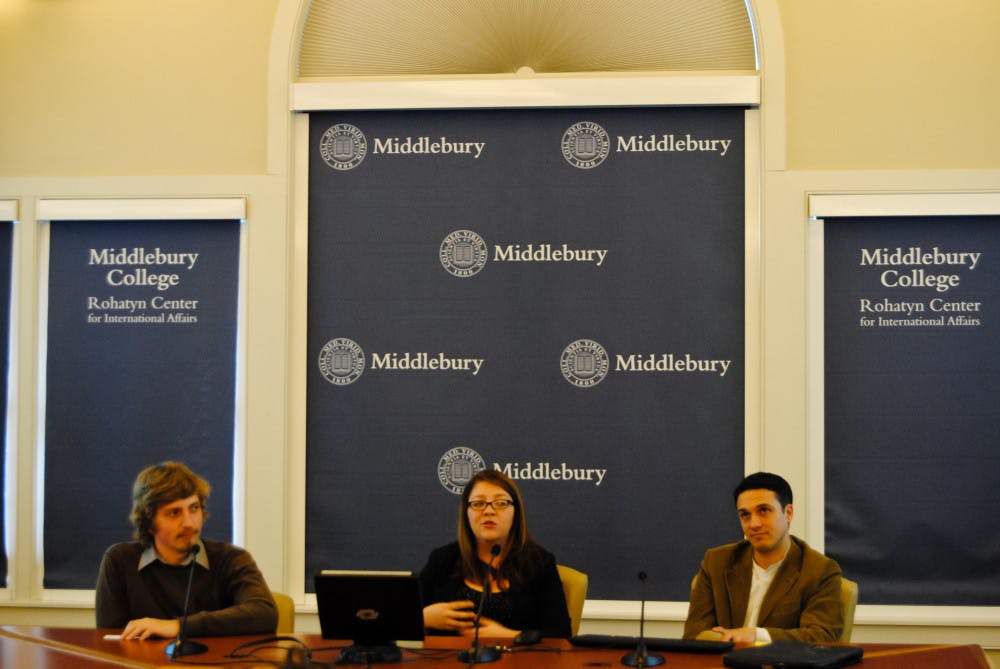Today the world faces a water crisis of unprecedented gravity. According to the U.N., 85 percent of the global population lives on the driest half of the earth and water is estimated to become scarcer with the projected increase in population. Yet as population expansion and development raise the demand for water, climate change rapidly diminishes its supply by melting the glaciers and snowcaps of the planet’s greatest freshwater reservoirs at record rates.
In light of this crisis, from March 14 to 16, the College’s Rohatyn Center for Global Affairs hosted its First Annual International Conference, titled “The Politics of Freshwater: Access and Identity in a Changing Environment.” The event brought together interdisciplinary scholars from national and international institutions to speak from varying perspectives regarding the processes that affect access to freshwater, such as climate change, land use, damming, privatization, commoditization and pricing. The symposium also focused on strategies to improve human interaction with vital freshwater around the world. The talks aimed to analyze these matters historically as well as with a view toward successfully addressing them in the present.
The symposium was co-sponsored by the Christian A. Johnson Economics Fund, C.V. Starr Middlebury Schools Abroad, the program in environmental studies, Franklin Environmental Center at Hillcrest, the departments of English and American literatures, classics, geography, political science and the Rohatyn Center.
Professor of Geography and Director of the Rohatyn Center Tamar Mayer, identified five reasons that the politics of freshwater was selected as the topic for the inaugural symposium. First, water is the source of life for all organisms on earth. Secondly, water serves as an important aspect of different cultural and national groups across the world. Third, the politics of water have sparked a great amount of conflict in recent years, and the possession of water has become an economic commodity as well. Fourth, the access to freshwater is an unmistakable source of conflict across boundaries and cultures as well as within local and regional situations. Finally, the UN has designated 2013 as the international year of water cooperation.
In her opening remarks, Professor Mayer elaborated on the purpose of these conferences.
“The idea is to have an annual conference on a global theme that can be discussed from multiple disciplinary perspectives and can both contribute to our International and Global Studies (IGS) curriculum and connect our campus to C.V. Starr-Middlebury Schools Abroad,” she said. “To this end, we have invited scholars from the social sciences and the humanities as well as policy makers and engineers in the field of water management.”
The symposium welcomed scholars and academics from Dartmouth, Oberlin, Wellesley, Colgate and Universidad de La Rioja (La Rioja, Spain).
The water symposium ties into one of the IGS spring capstone seminars concerning water, as well as to a teleconference on the same subject that Arabic students on campus have had with Middlebury students studying abroad in Jordan.
“We want to bring the entire campus to the Rohatyn Center through these events,” said Mayer. “We want the arts, social sciences and humanities to come together to talk about these issues.”
In the four days preceding the three-day conference, Middlebury students and faculty participated in presentations pertaining to water, featuring representatives from non-profit organizations and Middlebury and Monterey Institute of International Studies students and faculty involved in water research. Robert Hoesterey, Director of Strategic Development of The Eden Projects, spoke on Wednesday about his work in Ethiopia and Madagascar decreasing povery through deforestation projects.
On Thursday, photographer Edward Burtynsky gave a lecture about his exhibit “Nature Transformed,” currently on display in the Middlebury College Museum.
On Friday, the Robert A. Jones House hosted three different panel discussions, titled “Water Divided,” “Changing Water and Land Use” and “Water Territories,” with a number of visiting professors.
Two more panel discussions were held on Saturday, “Sustaining Multiple Uses of Water” and “Access to Water and Resistance.” The conference came to a close on Saturday afternoon with a summary and concluding discussion.
The organizers of the symposium, Mayer and Visiting Assistant Professor of Environmental Studies Catherine Ashcraft, began planning for the event last July. They envision that the College will continue holding such annual interdisciplinary international conferences, and have chosen other global themes to discuss in subsequent years.
Professor Lina Abu-Ghunmi, from the University of Jordan, who gave a talk called “Grey Water Concept Toward Mitigating Water Shortage” and specializes in wastewater treatment, noted the significance of the symposium.
“We’re focusing on different scientific fields and bringing together economists, sociologists and engineers and looking at different situations all over the world,” she said.
Monterey Professor Pushpa Iyer spoke about “The Politics of Muddled Waters in Gujarat, India: Environmental, Economic, Social, and Cultural Influences.”
Iyer, whose expertise includes identity conflict and South Asia, said of the symposium, “This is wonderful. It’s the right size for meaningful interaction to happen. It gives us the opportunity to connect with scholars and really get to know their research.” With respect to the freshwater problems confronting the planet, she stated, “Sociocultural and political challenges dominate. Water is not just a resource that needs to be managed. It involves layers of complexity that make arriving at one solution hard, but these difficulties have to be analyzed to effectively deal with the issue.”
Marjeela Basij-Rasikh ’15 attended the symposium and believed that the conference was a crucial event to take place, especially in a liberal arts environment.
“It was very inclusive, encompassing even the social and spiritual aspects of water,” she said. “We care about the environment a lot on campus, so we need such insights from people who are experienced in the field. It allowed me to understand how individual participation matters and how I could take action. I encourage more students to take advantage of future conferences.”
Water Symposium Addresses Global Water Supply Crisis

Comments


